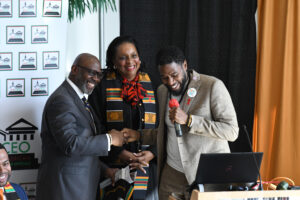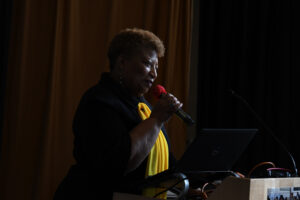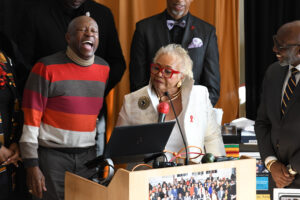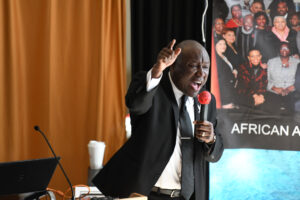‘Heroes of American history’ — a who’s-who of modern historians descend on Medgar Evers College

By David Gil de Rubio | dgilderubio@mec.cuny.edu
Since its founding in 1989, the African American Clergy and Elected Officials Organization (AACEO) has convened pastors, priests, ministers, elected officials, principals, officers and community stakeholders to advocate for social and economic justice where it’s most needed.
It’s natural that they bring that message to Medgar Evers College as often as they can — and February 7, 2025 was a shining example of the two worlds colliding.
AACEO held its 2025 Modern Historians breakfast event that featured a who’s who of elected officials. Among those being honored were Public Advocate Jumanne Williams, Brooklyn District Attorney Erick Gonzalez, Bronx District Attorney Darcel Clark, Judge Robin Shears and Former Congressman Edolphus Towns.
Other notable attendees were New York City Mayor Eric Adams, New York City Comptroller Brad Lander and former New York City Deputy Mayor Sheena Wright.
With the college’s AB1 building packed to the rafters, guests paid homage to the 2025 Modern Day Historians who were being recognized.
The day’s honorees also included ABC Reporter Phil Taitt, HIV/AIDS and Health Advocate Debra Fraser Howze and noted civil rights attorney Ben Crump, who flew in all the way from California. Other honorees included a number of NYPD Chiefs (Scott Henderson, Judith Harrison, Victoria Perry, Winston Faison) and NYPD Lt. Patrick Gordon.
The event was hosted by Dr. Robert Waterman, the president of AACEO and a long-time staff member at Medgar Evers College, and emceed by AACEO CEO and community activist Dr. Dee Bailey.

The event featured a number of keynote speakers that often invoked the spirit of Medgar Evers College’s namesake along with founders like Dr. Al Vann. Bailey herself talked about Vann’s efforts to get the Central Brooklyn community to help out when Hurricane Katrina hit New Orleans back in 2006. It was also the first time she met the then-future New York City Public Advocate.
“God rest Al Vann’s soul, but I remember he said he needed his best people and he was going to form the Hurricane Katrina committee,’” she recalled. “He said he wanted me and Joe [Mashariki, Black Veterans for Social Justice] to pull it together and get me some of the best organizations we have in Bed-Stuy. I was chairing the meeting and there was this young man who I’d never met, who was sitting right next to me. I asked who he was and he said, ‘My name is Jumaane Williams.’ And we talked, he worked, and we did what we needed to do, which was take 13 families from New Orleans and take care of them with medical care and other things they needed. He worked hard and continues to work hard today.”
Stepping up to receive his 2025 Modern Historian honor, Williams delivered a speech centered on unity versus finger-pointing, particularly in terms of the migrant crisis.
“I tell folks to be careful about where you put your marker of bias because someone else’s marker includes you,” he said. “When I hear folks saying to look at all the money we spent on migrants, we need to step back and ask why that money wasn’t spent on us. We’ve always had the money we needed to feed the hungry, the old and people that need clothing and to get people into housing that need housing and why didn’t we spend that money when we had it? Let’s not fall into the trap of blaming people who did not make that decision, because we’ve got to hold it together.”
In adding to his plea for banding together, Williams made an important point about the dangers of censorship.
“What’s happening now is the criminalization of existence,” Williams said. “They are trying to erase people, from our migrants and Black folks to our LGBTQ trans folks. Don’t turn away from that moment because it’s important. Trans youth not getting their healthcare is not going to help you get your healthcare. And if we all get together, we’ll get what we need. But we cannot get through this if we don’t hold onto everybody’s hand, so let’s really do that.”

Also being honored was Debra Fraser Howze, a longtime AIDS activist in the Black community who founded the National Black Leadership Commission on AIDS (NBLCA) in 1987, and authored the federally funded Minority AIDS Initiative (MAI) in 1998. The MAI was founded in response to how racial and ethnic minorities in the United States were being impacted by HIV/AIDS.
More recently, Fraser Howze responded to the pandemic’s impact on the Black community by founding Choose Healthy Life (CHL) in October 2020, using faith and medical science to connect underserved communities via the pipeline of the Black church. Not surprisingly, faith was a main cornerstone in Fraser Howze’s acceptance speech, during which she revealed that she was recovering from a stroke on both sides of her brain and a heart attack. Yet, it didn’t dim her passion in addressing attendees.
“I have been through a lot, but you know what?” Fraser Howze asked. “God is still on the throne. I have to say to you that I’m so proud of Dee. We raised billions of dollars to fight AIDS in the Black community. [Al] Sharpton told me that, ‘Maybe your journey is tougher because your purpose is greater.’ And that’s what I say to Dee and all the people that are here with me and helped me build all of the things I had to build.”
She added, “We built Choose Healthy Life and we have raised more than $30 million for the Black church out of COVID-19 so they can give vaccinations and conduct a wellness campaign all over the country because we’re not afraid of nothing. Hazel Dukes once told me that the one thing you want to ask God to do is to let you keep your right mind. I thank God for all of you because without you, I wouldn’t have my right mind.”

Keynote speaker and prominent civil rights attorney Ben Crump, who flew overnight from California to receive his 2025 Modern Day Historian award, closed out the breakfast. Speaking for nearly half an hour, Crump’s tone was fire and brimstone in its passion. Along the way, he quoted Angela Davis (“I will no longer accept the things I cannot change. But today, I will commit to fight to change the things I cannot accept”), Frederick Douglas (“Without struggle, there can be no progress”) and Medgar Evers (“If we can educate the masses, then we can lift the race”).
In speaking to avoid what Williams earlier referred to as “the criminalization of existence,” Crump railed against the efforts to dismantle Diversity, Equity and Inclusion — “virtues of any humane, civilized society” — and erase Black history.
“We have to speak truth to power,” Crump said. “As the great Negro historian Carter G. Woodson said, ‘If a race has no history, values or tradition that are respected enough to teach to the children of the next generation, then that race becomes a negligible thought in the minds of the world and at best, becomes endangered with being exterminated from the face of the Earth.’ Black icons like Medgar Evers, Frederick Douglass, Carter G. Woodson, Malcolm X, Martin Luther King, Jr., Coretta Scott King, Betty Shabazz were not a mere footnote of American history.
“They were the heroes of American history.”